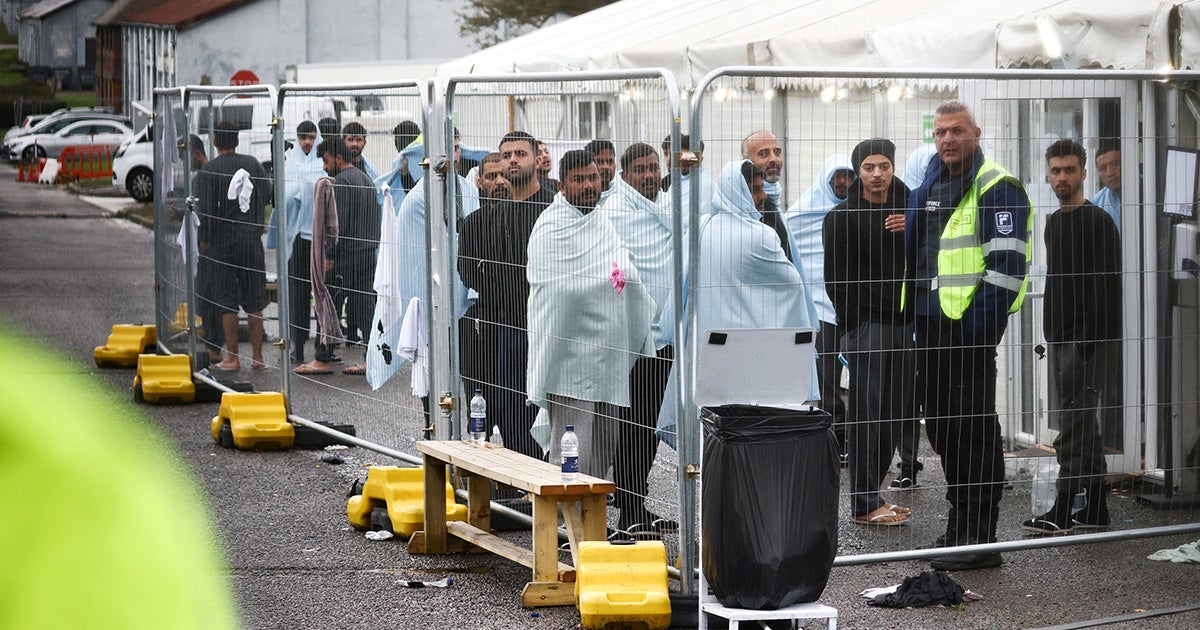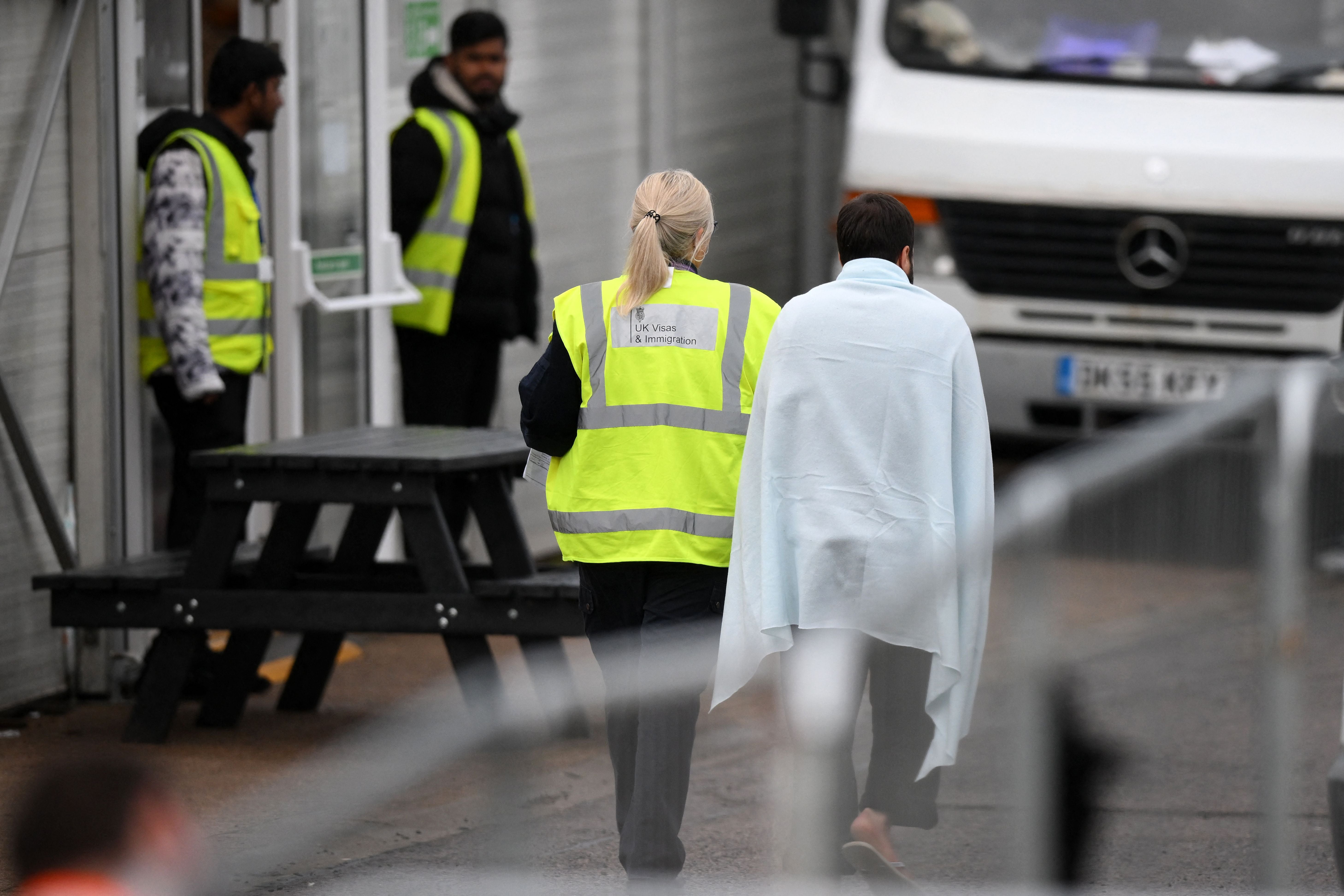Home Office ignored warnings on diphtheria weeks before Manston outbreak
Exclusive: Call for public inquiry after authority warned of ‘severe outcomes’ in processing centres and called for vaccinations
The government failed to act on a warning that asylum seekers in reception centres should be vaccinated against diphtheria, weeks before a man held at the overrun Manston site died, The Independent can reveal.
A major refugee charity has called for an independent inquiry into the facility, as the home secretary was accused of “putting anti-asylum rhetoric above safety” while Labour slammed a “chaotic” response.
A risk assessment issued by the European Centre for Disease Prevention and Control (ECDC) on 6 October said the illness was spreading among migrants and a “severe outcome” was possible for those living in crowded facilities.
The UK Health Security Agency (UKHSA) had issued a briefing note in September warning of an increase in diphtheria cases in Britain and Europe and reminding authorities working with migrants to ensure they were vaccinated.
But the mass use of antibiotics and vaccinations at Manston did not start until earlier this month. Previously, migrants were not having their diphtheria immunisation status checked until they were seen by a GP after being moved to hotels.
By that point, many had been detained in crowded tents at the former military base for weeks because of a shortage of Home Office accommodation.
The ECDC bulletin on 6 October said a migrant had already died of diphtheria in Europe and added: “Most of the current cases are being reported among migrants residing in potentially crowded settings and where some individuals may be unimmunised … in these settings, a severe outcome following a diphtheria infection is possible.”
It warned that the impact of an outbreak in migrant reception centres would be worse than among the wider public, and “heightened in instances where response measures are delayed”.
The ECDC recommended measures including the “vaccination of individuals residing in migrant centres”, isolation of possible cases, contact tracing and limiting overcrowding.
The bulletin was issued as the population of Manston, which was meant to hold a maximum of 1,600 migrants for 24 hours at a time, soared towards a peak of 4,000 by the end of October.
Yvette Cooper, the shadow home secretary, accused the home secretary of failing to act on public health information in a “completely chaotic” response to diphtheria.
“It’s clear they should have had sensible screening in place months ago,” she told The Independent.
“Ministers should tell us what they were told and when. They shamefully failed to tell councils and public health officials what was happening and they are still failing to make sure everyone who has been in Manston is now screened or vaccinated. They need to get a grip.”

Enver Solomon, chief executive of the Refugee Council, said “grave failings” at Manston had put the health of vulnerable people at serious risk.
“We must now see an independent inquiry into Manston, which can identify key lessons for the Home Office to ensure it does things differently in the future,” he added.
The Detention Action charity said the government had “ignored warnings and recommendations from experts” and their own advisers time and again.
Deputy director James Wilson added: “Manston exceeded three times its capacity for weeks, creating horrific conditions which encouraged the spread of infectious disease amongst extremely vulnerable adults and children.
“It is deeply concerning that the home secretary appears to have put anti-asylum rhetoric above the safety and well-being of people in her care.”
The prisons watchdog raised concerns about the “poor management” of infectious diseases at Manston following a visit in July, with a report saying: “Paramedic staff were unsure of any guidance, policy or procedure for the management of infectious diseases.”
But Home Office ministers and officials downplayed concerns about diphtheria until Monday, when the UKHSA said there had been 50 confirmed cases among asylum seekers so far this year, with two severe cases requiring hospitalisation and one death.
ECDC documents show that Britain was the second country in Europe to record diphtheria among migrants this year, reporting its first case in February, but Home Office ministers and officials did not make any public statements until media reports of an outbreak at Manston in late October.
Representatives responding to questions about diphtheria from parliament’s Home Affairs Committee on 26 October made no mention of vaccination or isolation.
Dan O’Mahoney, the Clandestine Channel Threat Commander, said a “very small number of cases” at Manston were being “dealt with expertly”, adding: “I would not describe it as an outbreak.”
On 31 October, Suella Braverman answered a question on diphtheria in parliament by accusing an MP who called the conditions at Manston unsafe and inhumane of using “inflammatory language” and saying they should not “create alarm unnecessarily”.
Addressing parliament on Monday, immigration minister Robert Jenrick denied that it had taken the death of the migrant on 19 November for the government to focus on the threat from diphtheria.

“This individual’s death is deeply regrettable, but we have been working on, and alive to, this issue for many months,” he told MPs, saying the “advice of the UKHSA has been followed throughout”.
Mr Jenrick said that “robust screening processes” were now in place and that vaccinations were being offered to all those arriving at Manston.
“There is testing for those presenting with symptoms and for close contacts, and those testing positive are being isolated in a designated place,” he added. “No one presenting with symptoms will progress into the asylum accommodation system.”
The UKHSA said many of the ECDC’s recommendations were already in place in England and that its guidance was taken into account.
Dr Gayatri Amirthalingam, deputy director of public health programmes at UKHSA said: “In September, ahead of any ECDC recommendations, we notified the public health system of an increase of diphtheria in asylum seekers in this country and in Europe and reminded all stakeholders to ensure new arrivals had their vaccination status checked and updated.
“Following an increase in cases, the challenges of contact tracing in asylum seeker accommodation settings, and the need to minimise the risk of transmission, we enhanced our advice to recommend that all asylum seekers are vaccinated upon arrival and received prophylactic antibiotics. We were the first country in Europe to recommend this.”
The Home Office said asylum seekers were most likely to have become infected with diphtheria before they arrived in the UK.
A spokesperson added: “We have followed the guidance provided by UKHSA at all times and the vaccination programme was set up by 15 November, within days of this advice being provided to the Home Office.
“We take both the welfare of those in our care and our wider public health responsibilities extremely seriously.
“Full procedures, including treatment with antibiotics and isolation processes has been followed in accordance with UKHSA advice.”
Join our commenting forum
Join thought-provoking conversations, follow other Independent readers and see their replies
Comments

Bookmark popover
Removed from bookmarks